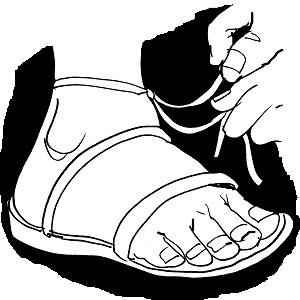
"I have baptized you with water; he will baptize you with the Holy Spirit" (Mark 1:7).
1 Jn 5:5-13; Mk 1:7-11
The gospels reflect a struggle in the early church between the followers of John the Baptist and the followers of Jesus, which persisted into the first century. The evangelists make clear in their accounts that John never claimed to be the Messiah nor sought the ultimate loyalty of his own disciples. He was a precursor, someone sent by God to prepare the way for another, namely Jesus.
In today's gospel passage from Mark, the distinction is made between the baptism of John and the baptism of Jesus. John invited the people to cleanse themselves with water, a sign of conversion, change of heart, turning away from sin to righteousness. Jesus' baptism with the Holy Spirit was a moment of new creation.
The imagery from Genesis of the first creation, and later, the story of Noah's Ark, depicts so much more than simple cleansing. To be baptized with the Holy Spirit is to be drawn up from the primordial waters of the void and formed in the image the Creator. The sign of the dove that signaled the end of the flood and the beginning of creation again is another way of describing Jesus' baptism. Jesus comes up out of the waters of the Jordan and a dove descends on him while a heavenly voice identifies him as the Beloved Son, the image of God. He is the ark of salvation that will save a sinful world.
Jesus brings a new creation. He is the first new human being, what God intended, for he bears the full image and likeness of God. John, whom Jesus calls the greatest of the first covenant prophets, can only point forward to this gift. His baptism is for repentance and restored obedience to the Law. Jesus is announcing God's mercy, given freely to anyone who opens their heart to the gift, especially sinners and outsiders who imagine they are beyond redemption and doomed to exclusion from the life of God. The Holy Spirit breathes life into our futile human efforts to be good, and fills us with the divine gift of holiness.
The New Year is a time when so many resolutions are made that will be inevitably broken. Well-intentioned people typically move from resolve to heroic effort to become some ideal they imagine will bring them peace and the approval of others. We know from experience that weight loss or better habits, as valuable as these are, do not bring real transformation. Deep change comes only through the love of another that enables us to first accept ourselves as we are, then to accept others in the same way, with graciousness and humor, patience and humility.
This is the only path and process of affirmation that over time can help us grow, not to some ideal of perfection, but as a real human being among other human beings, capable of compassion and forgiveness as together we come to know God. This is the baptism that the Holy Spirit gives. Take a deep breath and go forward. God's mercy will see us home.





